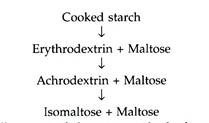The functions of saliva are:
1. Lubrication of food:
Assisted by chewing, saliva gets mixed with food in the mouth; the mucin which is a sticky substance helps to form bolus. Saliva prepares the food for swallowing forming a slippery coat over the bolus.
2. Solvent action:
Taste is a chemical sense. Any substance, the taste of which has to be perceived, has to be in dissolved state to stimulate the taste receptors present in taste buds thorough-out the oral cavity. Saliva acts as the solvent and thereby helps for perception of taste.
3. Cleansing action:
The continuous flow of saliva keeps the mouth clean, free from food particles; shed epithelial cells and foreign bodies. Moreover, the lysozyme present in saliva helps to kill certain bacteria. The evidence of this action is obvious during fever. In most of the fevers, the salivary secretion is diminished.
4. Digestive function:
Salivary amylase or ptyalin is a carbohydrate splitting enzyme. It acts at a pH of 6.8. It can act only on cooked starch. When the starch is boiled, the cellulose covering of starch granules break and amylase can penetrate cellulose.
Cooked starch is digested by ptyalin in the following manner:
Small amount of glucose may also be formed.
The duration for which food remains in the mouth is not sufficient for all these steps to be completed. Once the food reaches the stomach, the pH of stomach is highly acidic and hence not conducive for ptyalin action. Yet the action of ptyalin continues in the deeper part of food bolus even in the stomach.
5. Excretory function:
Several substances can be excreted in saliva, e.g. heavy metals like mercury, lead, iodides, alkaloids like morphine, antibiotics like penicillin, streptomycin, microorganisms like viruses causing mumps, measles, polio, etc. But most of the times, the saliva formed is being swallowed. Thus it may not serve much of excretory function.
6. Helps in speech:
The moistening action of saliva in the mouth helps in articulation of speech. Those who speak for a long time sip a little water in between to facilitate articulation of speech.
7. Role in regulating water content in body:
Since saliva contains 99.5% water and daily secretion of saliva is 1 liter or more, decrease in body water content decreases salivary secretion and results in thirst sensation.
8. Buffering function:
Saliva contains bicarbonate, phosphate, proteins, etc. They act as buffers to keep the salivary pH within the normal limits. Decreased pH predisposes to caries whereas increase in pH will be responsible for tartar material and destroys the alveogingival margin.
